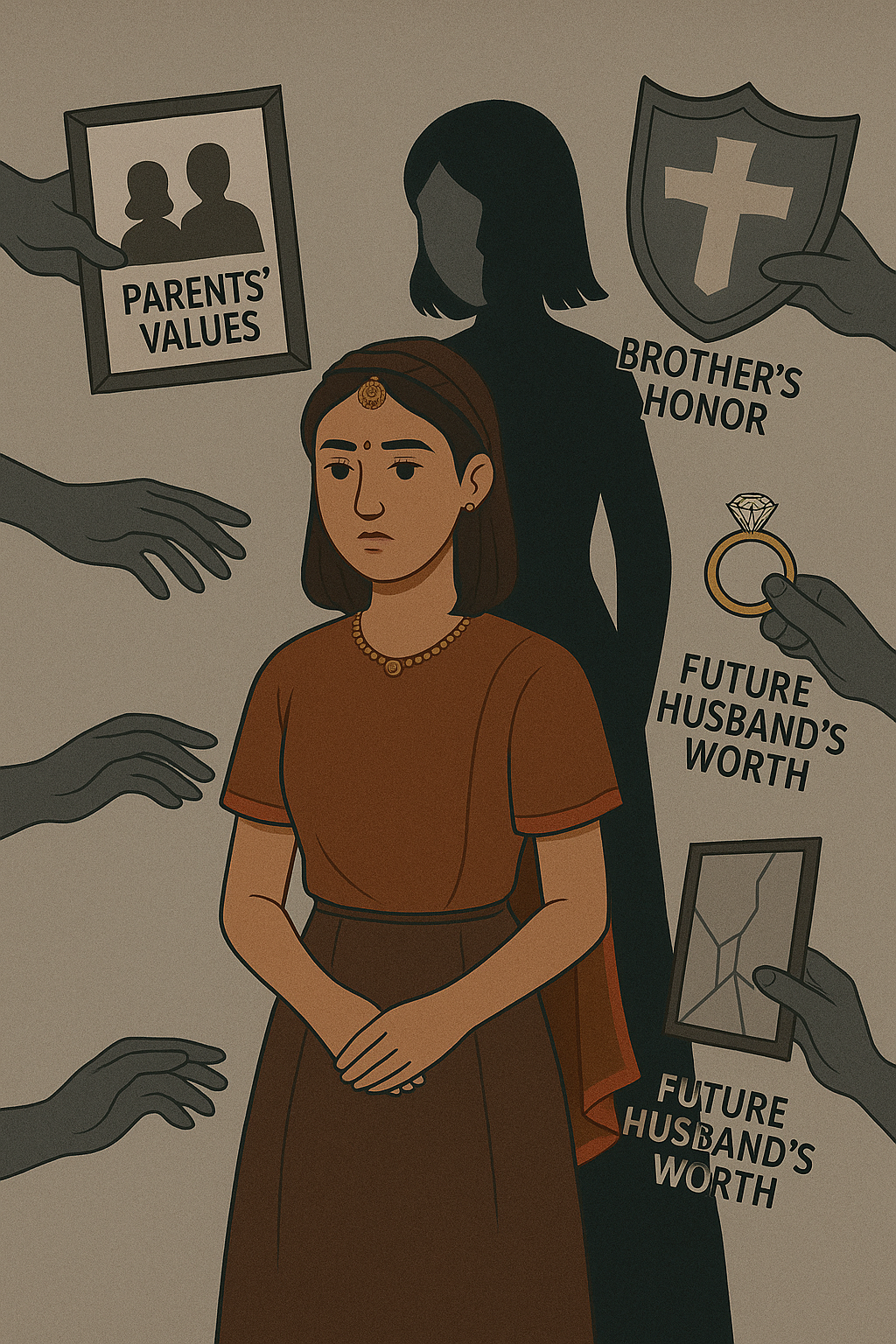Introduction
She always speaks politely, listens quietly, dresses modestly, and makes sure not to upset anyone. People expect her to stay calm, show care to others, and be available when needed. From a young age, everyone around her, family, teachers, media, and even religion, praises her when she behaves this way. They teach her to put others’ needs before her own, to suppress her anger, and to keep her wishes private. They expect her to act small, quiet, and humble, even if it means ignoring who she truly is. But when she smiles to please everyone, what does she lose in return? What is the real cost of being a good girl?
In many parts of Pakistan, people teach girls to stay quiet, follow rules, and put others first. They link a girl’s behavior to her family’s honor. Her choices often are not seen as her own. Instead, people say she represents her father’s pride, her brother’s reputation, or her future husband’s value. This pressure makes her give up her dreams, her voice, and sometimes even her life.
The article The Cost of a Good Girl: Truth Behind Honor Culture in Pakistan explains how society expects women to obey rather than be independent. These expectations are not harmless; they trap women in unfair roles.
When women make their own choices, especially about love or marriage, some families punish them. In extreme cases, families kill them in the name of “honor.” The article Honor Killings in Balochistan: The Price of Love shows how a woman’s freedom can cost her everything, just because she did not follow what others expected. This crisis is not small. Human Rights Watch estimates over 1,000 women die each year in Pakistan in honor-based attacks. Globally, activists have raised concerns over honor-based violence. Organizations like Amnesty International and Human Rights Watch continue to call for legal and social reforms to protect women’s rights. Similarly, the UN Women Pakistan initiative works to challenge harmful gender norms and advocate for women’s freedom and safety.
Mental Health and Emotional Repression of the Cost of Being a Good Girl
From a young age, girls are told to stay quiet, be polite, and never talk back. They hear things like:
- Good girls do not argue
- Do not speak loudly
- Smile, even when it hurts
These ideas come from many places, including the family, school, religion, and media. Girls learn to hide their emotions to avoid being judged or labeled as disrespectful. Over time, they stop expressing anger, sadness, or even happiness if it feels “too much.”
This emotional control turns into a habit. Many women grow up feeling they must please everyone and avoid conflict at all costs. They smile even when they are exhausted. They agree even when they are uncomfortable. Slowly, this leads to anxiety, stress, and emotional numbness. Because people rarely talk openly about mental health, especially when it affects women, these struggles sometimes go unnoticed. Society tells women to be strong and silent, but never asks how they feel.
The emotional cost of being a good girl runs deep. It teaches women to hide who they really are, until tehy forget how to feel at all.”
Delayed Self-Discovery as Cost of Being a Good Girl
People let boys explore the world around them. They tell them to speak up, follow their dreams, and try new things. But when it comes to girls, the message is usually the opposite: follow the rules, stay quiet, and do not question too much.
As a result, many girls grow up doing what others expect from them. They try to be perfect daughters, students, wives, and mothers. They rarely get the chance to ask, “What do I want?” or “What do I want to be?”
By the time they become adults, many women feel lost. They struggle to make choices for themselves, not because they do not have opinions, but because no one ever taught them that their voice matters. They have spent so much time being told who to be; they never learned to know themselves.
When girls grow up always trying to please others, they often forget how to understand or express their needs.”
Cultural Policing and the “Good Girl” ideal
In many families, people treat the “good girl” not just as a daughter or individual, but as a symbol of family respect. People do not see her actions as her own; they treat them as a reflection of her parents’ values, her brothers’ reputation, and her future husband’s worth. The pressure on her is not just personal; it becomes a social burden she never asked for.
People judge everything she does. They comment on her clothes, hw loudly she laughs, what she posts on social media, and even how she walks or sits. If she speaks up, she is “shameless.” If she stays silent in an abusive relationship, they praise her patience. Society does not ask, “Is she okay?” It only asks, “What will people say?”
She slowly turns into something else:
- A symbol of honor, instead of a person with feelings.
- A sacrifice for the family’s name, instead of someone with dreams.
- A boundary between respect and shame, instead of being with choices.

People do not protect her; they control her. They use her behavior as a measuring stick for morality, but only when it suits their idea of respect. If she makes her own decisions, they call her rebellious. If she follows the rules quietly, they call her good, even if she is hurting inside.
Cultural moral policing does not build good girls; it breaks real ones and replaces them with silent, obedient shadows, at the cost of being a good girl.
Economic Cost of Being a Good Girl
Being a good girl does not just affect how a woman feels; it also affects her job, income, and future. When girls grow up learning to stay quiet, adjust, and make others happy, these habits follow them into adulthood.
Many women end up:
- They take lower salaries because they do not feel confident enough to ask for more.
- Staying in unfair jobs or toxic workplaces because they do not want to create conflict.
- Many women say yes to extra work because they want to avoid being called “difficult.”
- Many women avoid leadership roles because they fear others will call them “bossy” or “too proud.”
On the other hand, men in the same situation speak up, ask for raises, and take charge, and people admire them for it. People judge women or label them as rude when they do the same.
This unfair difference teaches women to play small, even when they are capable of more. They hold back from opportunities, not because they cannot do it, but because they fear how people will react.
Trying to please everyone may protect a woman’s image, but it also costs her confidence, money, and progress.”
Empowered Women
People spread the false idea that being a “good girl” makes life smoother, that if a woman stays quiet, follows the rules, and avoids trouble, she will be safe, loved, and respected. But this belief is a trap. In reality, being a good girl makes it easier for others to control her.
The more a woman obeys, the more people expect her to keep obeying. If she never says no, they keep asking; if she stays silent, they speak over her. Moreover, if she agrees to everything, they never ask what she wants. Over time, society trains her to stay small, and that slowly takes away her sense of self, not because she lacks strength, but because she’s been taught to hide it.
When a woman finally decides to step out of this mold, to speak up, set boundaries, or make her own choices, the world often pushes back.
- When a woman starts speaking up, people say she talks too much or doesn’t know her limits.
- If she shows confidence, they accuse her of having an ego.
- And when she makes choices without asking for approval, they label her as selfish or out of control.
They do not question why she stayed silent for so long; they only react when she stops.
But choosing empowerment is not rebellion. It is not about being rude or disrespectful. It is about a woman taking back her right to live as a full person, with her voice, choices, and dreams.
Being “good” should never mean being silent, scared, or small. True strength lies in choosing yourself, even when the world tells you not to.”
What Needs to Change?
If we want to break this harmful cycle, we need to change the way we raise and treat girls, and the way we understand strength.
We must start teaching girls to lead with confidence, not just follow instructions. Instead of teaching them to seek approval, we should encourage them to trust their voice and speak their truth.
We must also stop treating emotions as weaknesses. Both girls and boys should learn that expressing feelings is healthy, not shameful. When we allow all genders to feel and express without fear, we raise emotionally strong people.
It is time to challenge the way society glorifies female sacrifice. Giving up dreams, staying silent in pain, and constantly adjusting should not be seen as signs of honor; they are signs of unfair expectations.
We must create space for women and girls to set boundaries, make independent choices, and value their own needs. True empowerment comes from knowing your worth and not letting anyone else define it for you.
Let’s stop praising silence and submission. Let’s start celebrating courage, clarity, and authenticity.“
Final Thoughts: You Don’t Owe “Goodness” to Anyone
Being called a “good girl” should never come at the cost of losing who you are. No one should have to give up their dreams, silence their voice, or hide their true self to meet someone else’s expectations.
- Perfection is not something you owe the world.
- Blind obedience is not a duty you owe your family.
- And your silence is not a gift society has the right to demand.
What truly matters is what you owe to yourself.
Give yourself the freedom to feel without shame, the courage to speak without fear, the strength to stand without guilt, and the right to live fully, honestly, and unapologetically as you.
Call to Action:
The cost of being a “good girl” should not be her voice, freedom, or her life.
Comment below: What has the cost of being a good girl looked like in your life?




4 Comments